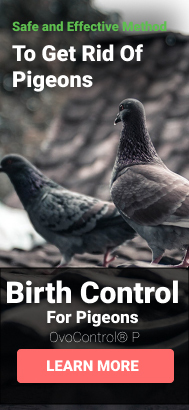Chemical Plant Bird Control: Proven and Effective Solutions
Written by Erick Wolf , Reviewed by Alexander MacDonald
Despite best-effort attempts in chemical plant bird control, these pests plague numerous facilities across the globe each year. Failing bird control for chemical plant facilities is, unfortunately, an added concern in terms of facility downtime and unnecessary costs.
Thankfully, chemical plants no longer have to fall victim to this never-ending battle with bird control. Today, bird control for chemical plant facilities comes armed with an arsenal of effective and safe products.
In this article, we’ll take an in-depth look at chemical plant bird control, including discussing why it’s crucial and identifying some of the most popular methods readily available today.
Why is Chemical Plant Bird Control Important?
Chemical plant bird control is crucial to facilities worldwide as the industry continues to be plagued yearly. Here are just a few primary reasons facilities should prioritize their bird control procedures.
Damage
Birds, and especially their feces, are notorious for damaging countless items around chemical plants. They can also be responsible for damages that include:
Product
Facilities
Equipment
Quality Control
Over time, these damages caused by birds can cause equipment corrosion, ultimately impacting quality control. Staying on top of quality control at a facility means keeping on track with bird control for chemical plant methods.
Health Risk
In addition to damage, birds can also pose a health risk to humans. Whether they are polluting chemicals with their feces or creating harmful spores that workers can inhale, it’s crucial to eliminate this threat around a plant.
Work Hazard
In addition to protecting workspaces and employees from destruction and health concerns, bird control in chemical plant facilities is important to avoid hazardous slips and falls.
Cleanup Cost
In addition to losing money from contaminated products, damages associated with birds can be costly to facilities. Replacing equipment and general cleanup costs continue to plague chemical plants.
Proven Chemical Plant Bird Control Methods
Various factors go into determining the best bird control method for chemical plant facilities, including the available resources, the size of the plant, and the types of birds in the area.
Here are the most popular chemical plant bird control methods available today.
Birth Control
When it comes to bird control for chemical plant facilities, bird birth control is the most humane option on the market. Bird birth control limits the flocks' capability to multiply at rapid, uncontrollable rates rather than attacking the live population.
Bird Netting
Mesh bird netting is one of the oldest forms of chemical plant bird control. It creates a physical barrier that prevents birds from landing or nesting.
Although bird netting can be generally effective, it is often not the ideal solution for larger, more extensive chemical plants.
Bird Spikes
Bird spikes come in various splay widths, ranging from one to ten inches. To help keep birds away from specific areas of a chemical plant, pikes can help prevent perching.
While effective in the areas the spikes are placed, unfortunately, birds will eventually find a way to rest in other locations whenever possible.
Visual Bird Deterrents
A method to scare birds away from chemical plants involves visual bird deterrents. There are various options when it comes to visual bird deterrents, including:
Sonic and ultrasonic emitters
Trained raptors
Effigies
Propane cannons
Reflected light sources
Visual bird deterrents work best alongside additional bird control for chemical plant methods.
Acoustic Bird Deterrents
Acoustic bird deterrents come in various forms, much like visual options. The two primary chemical plant bird control methods include audible and ultrasonic acoustic solutions. These options are great to explore when physical bird control is no longer available.
While acoustic bird deterrents can be effective, they are typically limited to specific species.
Why is OvoControl the Most Effective and Humane Method for Chemical Plant Bird Control?
When it comes to finding effective chemical plant bird control methods, you’ve probably noticed that it requires the use of multiple options to get the job done. Especially for larger, more extensive facilities, you might have to get creative and be willing to dole out a substantial amount of cash.
Thankfully, OvoControl is the new solution to bird control for chemical plant facilities.
How OvoControl Works
OvoControl is an edible, kibble-type bird birth control. Thinking it is food, birds consume the formula, which strictly limits the ability of a pigeon’s egg to develop fully as the birds feed.
The active ingredient nicarbazin has been used in chickens for enteric diseases for over 65 years. It was discovered as birth control by accident as researchers quickly found nicarbazin interfered with the egg’s vitelline layer, the membrane needed in an egg’s development. As a result, OvoControl integrated nicarbazin to serve as a bird sterilizer.
Final Thoughts
While there are a few different options for chemical plant bird control, they often require multiple solutions and can still be ineffective at minimizing costs and damages. OvoControl remains one of the most humane and practical solutions to bird control for chemical plant facilities today. Its multiple delivery options make it customizable to any bird population size, while its non-toxic active ingredient ensures humane treatment of the birds.





